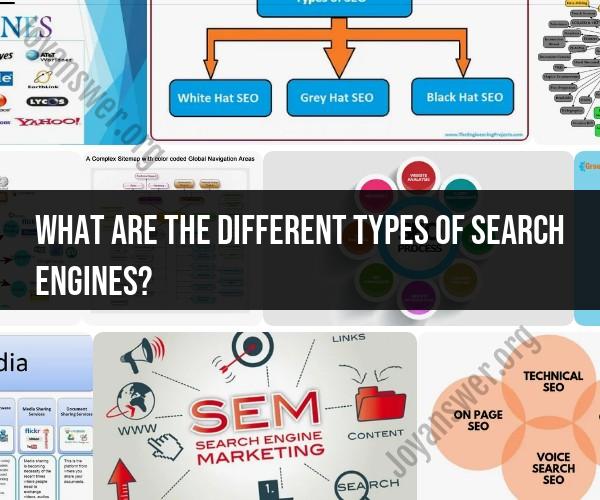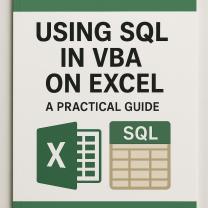What are the different types of search engines?
Search engines come in various types, each designed to cater to different information retrieval needs and niches. Here's a comprehensive overview of the different types of search engines:
General Search Engines: These search engines provide a broad range of search results covering all types of content on the internet. They are used for general information retrieval.
- Examples: Google, Bing, Yahoo, DuckDuckGo.
Specialized Search Engines:
- Vertical Search Engines: These focus on specific types of content or industries.
- Examples: Google Images (for images), Google Scholar (for scholarly articles), YouTube (for videos).
- Niche Search Engines: These cater to specific niches or interests.
- Examples: WolframAlpha (computational knowledge), Ecosia (environmental), Startpage (privacy).
- Vertical Search Engines: These focus on specific types of content or industries.
Metasearch Engines: Metasearch engines aggregate results from multiple other search engines, providing a broader set of results.
- Examples: Dogpile, Metacrawler.
Enterprise Search Engines: These are used by organizations to search and retrieve information within their own databases, intranets, and digital content.
- Examples: Elasticsearch, SharePoint Search.
Academic Search Engines: Designed for academic and scholarly research, these search engines focus on academic publications, journals, and research papers.
- Examples: Google Scholar, Microsoft Academic, JSTOR.
Job Search Engines: These specialize in job listings and employment opportunities.
- Examples: Indeed, LinkedIn, Monster.
People Search Engines: People search engines help find information about individuals, such as contact details and social media profiles.
- Examples: Spokeo, PeekYou.
Local Search Engines: These focus on providing location-based results, particularly useful for finding businesses, services, and attractions in specific areas.
- Examples: Google Maps, Yelp.
Shopping Search Engines: Designed for e-commerce, these search engines help users find and compare products and prices.
- Examples: Google Shopping, Amazon, eBay.
Torrent Search Engines: These specialize in searching for torrent files, facilitating the downloading of files such as movies, music, and software.
- Examples: The Pirate Bay, 1337x.
News Aggregators: While not traditional search engines, news aggregators gather and display news articles from various sources based on user preferences.
- Examples: Google News, Flipboard, Feedly.
Deep Web Search Engines: These search engines access the deep web, which includes content not indexed by general search engines, such as databases, private websites, and subscription-based services.
- Examples: DuckDuckGo (has a deep web search feature), BrightPlanet.
Voice Search Engines: These enable voice-activated searches using speech recognition technology.
- Examples: Siri (Apple), Google Assistant, Amazon Alexa.
Visual Search Engines: Visual search engines allow users to search for information using images rather than text.
- Examples: Google Lens, Pinterest Lens.
Semantic Search Engines: These search engines focus on understanding the context and meaning of words in a query to provide more relevant results.
- Examples: WolframAlpha, DuckDuckGo.
Social Media Search Engines: Social media platforms have their own search engines to find posts, users, and content within their networks.
- Examples: Facebook Search, Twitter Search.
These are just some of the many types of search engines available, each tailored to specific purposes and user needs. Depending on your information requirements, you may choose to use one or more of these search engines to find the information you're looking for.
Types of Search Engines: A Comprehensive Overview
There are two main types of search engines: crawler-based and human-powered.
- Crawler-based search engines use software to crawl the web and index websites. This means that they can index a large number of websites very quickly. Crawler-based search engines are the most popular type of search engine, and examples include Google, Bing, and DuckDuckGo.
- Human-powered search engines are compiled by humans. This means that they are not as comprehensive as crawler-based search engines, but they can be more accurate for certain types of searches. Human-powered search engines are often used for specialized topics, such as academic research or business.
Within the two main types of search engines, there are also a number of subcategories. Some of the most common subcategories include:
- General search engines: General search engines index a wide range of websites on a variety of topics. Examples include Google, Bing, and DuckDuckGo.
- Vertical search engines: Vertical search engines specialize in a particular topic or industry. Examples include Indeed (for jobs), Amazon (for products), and PubMed (for medical research).
- Metasearch engines: Metasearch engines do not index websites themselves. Instead, they search other search engines and return a list of results from all of the search engines. Examples include Dogpile and Yippy.
Navigating the Web: Different Categories of Search Engines
The different categories of search engines can be used to navigate the web in different ways. For example:
- General search engines are best for finding general information on a topic. They can also be used to find specialized information, but they may not be as accurate as vertical search engines.
- Vertical search engines are best for finding specialized information on a particular topic. For example, if you are looking for a job, you would use a vertical search engine like Indeed.
- Metasearch engines can be used to compare results from different search engines. This can be helpful if you are not sure which search engine to use or if you are not satisfied with the results from a single search engine.
Search Engines Unveiled: Understanding Variations
Within each category of search engine, there are also a number of variations. For example, some general search engines offer more features than others. Some vertical search engines focus on a specific region or language. And some metasearch engines allow you to customize the way that they search.
The best way to understand the variations of search engines is to experiment with different search engines and see which ones work best for you.
Here are some tips for choosing the right search engine for your needs:
- Consider your needs. What are you looking for in a search engine? Do you need a search engine with advanced features? A search engine that focuses on a specific topic? A search engine that respects your privacy?
- Read reviews. Read reviews of different search engines to get a sense of what other users think of them.
- Try different search engines. Don't be afraid to try different search engines until you find one that you like.
Once you have chosen a search engine, you can start to master web searches by learning how to use its features and tools effectively.













